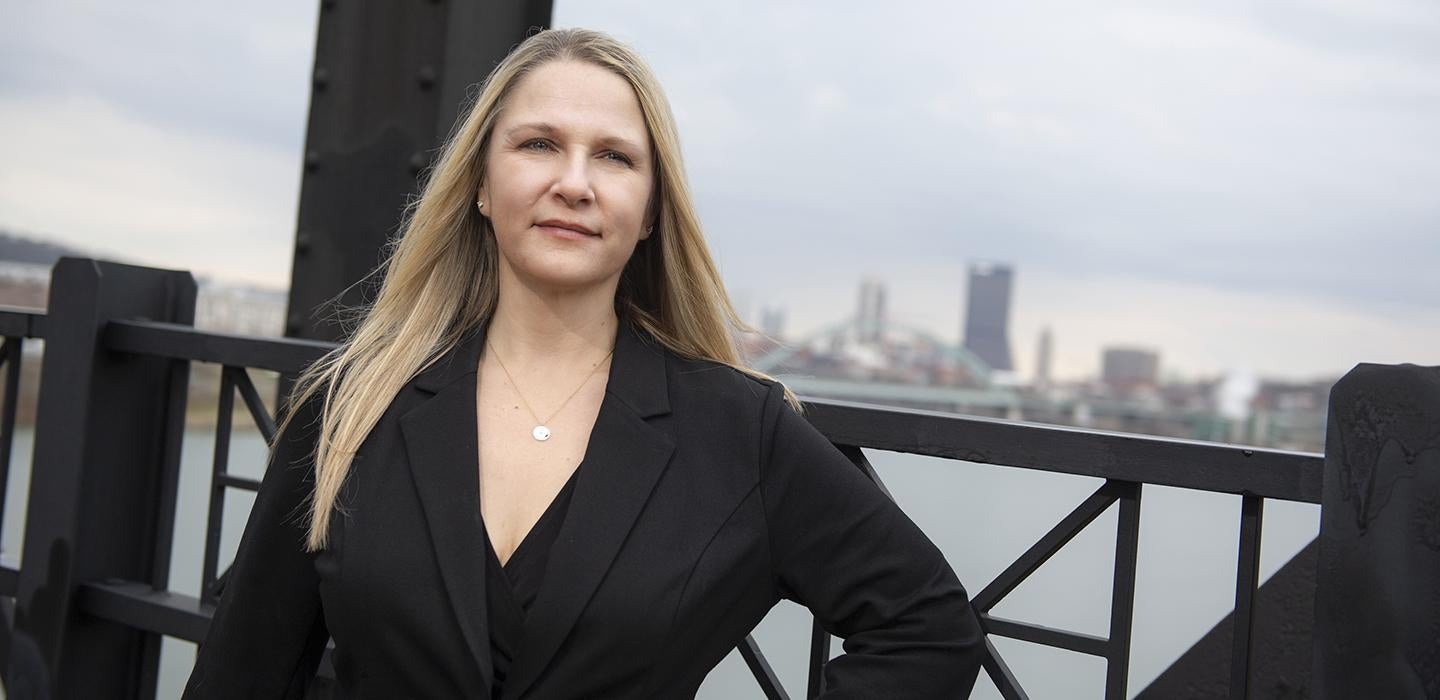
Subscribe to Pittwire Today
Get the most interesting and important stories from the University of Pittsburgh.Melissa Bilec is an expert on reuse, and she doesn’t have to look far for an example of it done well: Just nearby is Hot Metal Bridge, a former steel-mill structure that she helped convert into a pedestrian and bicycle bridge.
“From history, we can see these visions of hot metal ladles going across the bridge, and I think that’s so emblematic of Pittsburgh’s history,” she said. “Fast-forward to today, thinking about alternative transportation — I think there’s just so much symbolism there about reuse and how we should be designing for the future.”
A three-time alumna of Pitt’s Swanson School of Engineering (ENGR ’97, ’99G, ’07G), the William Kepler Whiteford professor and co-director of the Mascaro Center for Sustainable Innovation has a history with the University’s sustainability efforts that goes back decades — she even worked with the center as a graduate student.
Bilec’s Pittsburgh ties run deep, too. Raised in the region, her family was affected by the steel industry’s collapse, and today she sees a special role for Southwest Pennsylvania in transforming the economy into something more sustainable. That regional focus also guides her research. Along with Bilec’s work on environmental justice and the reuse of construction materials, she has recently focused on what’s called the circular economy: systems that enable products to be reused instead of sending them to landfills.
A circular economy, Bilec said, offers a way to combat two dire global challenges: climate change and the brittleness of supply chains, the latter of which has become increasingly visible over the past two years of surprise shortages and drastic price increases.
“I think everyone can agree that the global supply chain has largely failed,” she said. “Thinking about how to create strong regions that can be self-supporting is critical for our path forward, along with meaningful employment and equitable opportunities.”
These principles also guide one of the latest projects she’s helped lead: a collaboration with the polymers and plastics company Covestro to create a brand-new graduate program where students will learn to design products that can later be reused or that break down in ways that don’t harm the environment.
Most decisions about recycling or reuse, Bilec explains, take place at the end of a product’s life. “But the real innovation lies when you think about the beginning of design,” she said. That same approach can be used at all levels of the economy. “If you have the molecular designer talking with the product designer and the building designer and the city designer, you start to realize all the different spaces where design needs to change to foster circular economy strategies that can aid in climate change.”
Bilec will teach a course on circular economy design in the fall, part of the degree program for PhD students. But the program will span a wide range of disciplines, including law and supply chain issues, that are necessary for students to understand if they’re to tackle such a complex problem. Students will also be able to intern at Covestro and other industry and nonprofit partners.
This isn’t Bilec’s first foray into crafting educational programs. She developed the M.S. in Sustainable Engineering degree and helped develop the undergraduate sustainability certificate.
Now, as co-director of the Mascaro Center, she’s poised to steer sustainability efforts at the University on an even larger scale. The center’s leadership is working on a strategic plan to guide its work for the next five years at a time when Bilec sees a critical mass of support in Pitt’s leadership for sustainability principles and recognition of the urgency of environmental issues.
“Climate change is our biggest challenge, and Pitt has to be part of the solution,” she said. “We have so many different strengths in sustainability across the University. We just need to pull them all together and double down on our investment.”
Bilec hopes many Pitt sustainability leaders can play key roles in making that happen. For her, it’s simply a continuation of what she’s been doing all along. From when she was a graduate student, the branching paths of her career have all been directed by one question, she said.
“At the end of the day it’s: ‘Where can I have the biggest positive impact?’”
— Patrick Monahan


